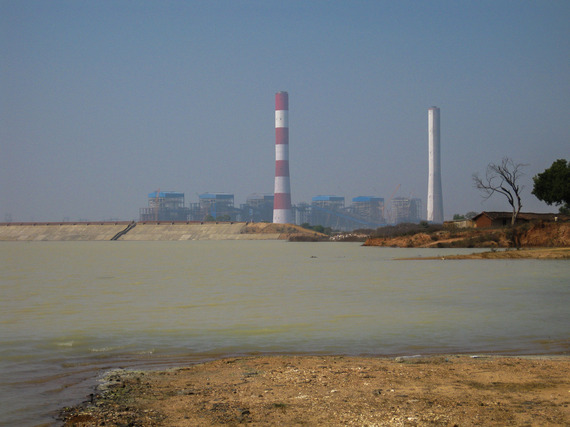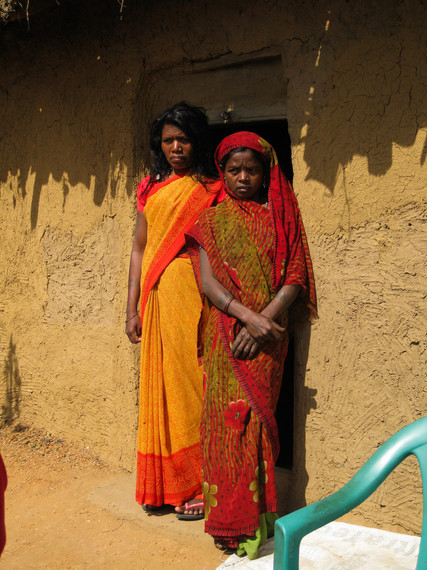
The Sasan coal-fired power plan and coal ash pond. Photo courtesy of Nicole Ghio.
A fact finding team of five non-governmental organizations (NGOs) -- the Sierra Club, 350.org, Carbon Market Watch, Friends of the Earth U.S. and Pacific Environment -- released a scathing report, The U.S. Export-Import Bank's Dirty Dollars, on the rampant human rights abuses at the U.S. Export-Import Bank (Ex-Im) financed Sasan coal-fired power plant and mine in Singrauli, India.
For years, reports of human rights, indigenous rights, labor, and environmental violations have plagued Sasan and its owner, Indian company Reliance Power, and the U.S. government are partly to blame. The 3,960-megawatt project has received over $900 million in taxpayer finance from Ex-Im, and when allegations against the project are raised, Ex-Im prefers to look the other way.
When Indian groups and NGOs alerted Ex-Im to a smokestack collapse that killed 30 workers, the Bank did nothing. When reports emerged of irregularities with the coal allotments for Sasan, foreshadowing the coal-gate scandal that would envelop then Prime Minister Manmohan Singh, Ex-Im said nothing. Eventually the outrage prompted the Bank to conduct a visit to the project, but while they met with Reliance, the Bank refused to meet in the communities. Instead, they insisted that the affected people who had faced violence at the hands of Reliance -- people without access to reliable transportation -- meet them at a hotel that catered to industrial interests. Shockingly, people were afraid to speak out in such an unsafe venue. But even so, they refused to stay silent for long.
Today's fact finding report contains first-hand accounts from the front line communities Ex-Im attempted to ignore.
What we uncovered in our trips to Sasan was heartbreaking. We heard from villagers whose homes were destroyed in the middle of the night while they were still living in them. We met with indigenous residents whose children were denied entry into schools. And we learned how Reliance covers up injuries -- and even deaths -- at the project.

This tribal child is one of the people who have been relocated in order to build Sasan. Photo courtesy of Nicole Ghio.
There were two groups, though, that we did not hear from. Reliance Power refused to meet with the fact finding team, and Ex-Im refused to provide the supplemental environmental reports -- including the remediation or mitigation plans and related monitoring documents -- that Reliance is required to submit to Ex-Im, and which federal legislation and the Bank's own policies require be made available on request.
Recognizing the risk Sasan could pose, Ex-Im classified it as a Category A project when the Bank approved the financing. This means the coal project is required to comply with additional standards, including the IFC Performance Standards and their provisions for environmental and social impacts, labor and working conditions, pollution prevention, community health, and resettlement. It is clear from first hand reports that Sasan fails in all these areas.
However, without the monitoring documents, it is impossible to know if Ex-Im willfully ignored these requirements or if it failed to do its own due diligence to monitor Sasan and investigate complaints. In order to learn the truth, the Sierra Club submitted a Freedom of Information Act (FOIA) request today to obtain the missing documents.
But the truth is not enough for the people living with the impacts of Sasan. They need justice.

This seed pod is covered in coal dust from the conveyor belt that brings coal to Sasan from the mine. Photo courtesy of Nicole Ghio.
We hoped the first step would take place last week, when the U.S. Export-Import Bank Office of the Inspector General (OIG) -- the independent investigative body for Ex-Im -- traveled to Singrauli for an inspection of Sasan. But the OIG seemed more interested in building a relationship with Reliance than listening to the communities.
The OIG representatives arranged to travel to Singrauli in a Reliance helicopter, but were forced to change their plans due to weather. Once they finally arrived, they also refused to meet with the affected people in their communities. The OIG did allow a few representatives to visit them at their hotel at 7:30 in the morning while Reliance officials waited outside and could take note of who attended, possibly endangering those who showed up.
The U.S. can no longer allow itself to be complaisant in the abuses taking place at Sasan. We call on the OIG to conduct a thorough inspection that includes follow-up visits using the best practices established by the CAO and with third party experts who can evaluate the impacts.
Moreover, it is imperative that Ex-Im use its influence to halt a proposed expansion of Sasan and work with Reliance to bring the project into compliance with the IFC Performance Standards. Should this prove impossible, Ex-Im must withdraw from the project.
To do less calls into question the legitimacy of the Export-Import Bank and its ability to effectively monitor the use of U.S. taxpayer dollars abroad.

Authored by:
Justin Guay
Justin Guay leads the Beyond Coal to Clean Energy work for the Sierra Club’s International Climate Program and is based in San Francisco. He works on international energy lending reform and international outreach for the organization with a focus on the Asia-Pacific Region. He has previously lived in Mumbai and spent time working with social entrepreneurs on distributed clean energy ...
No comments:
Post a Comment